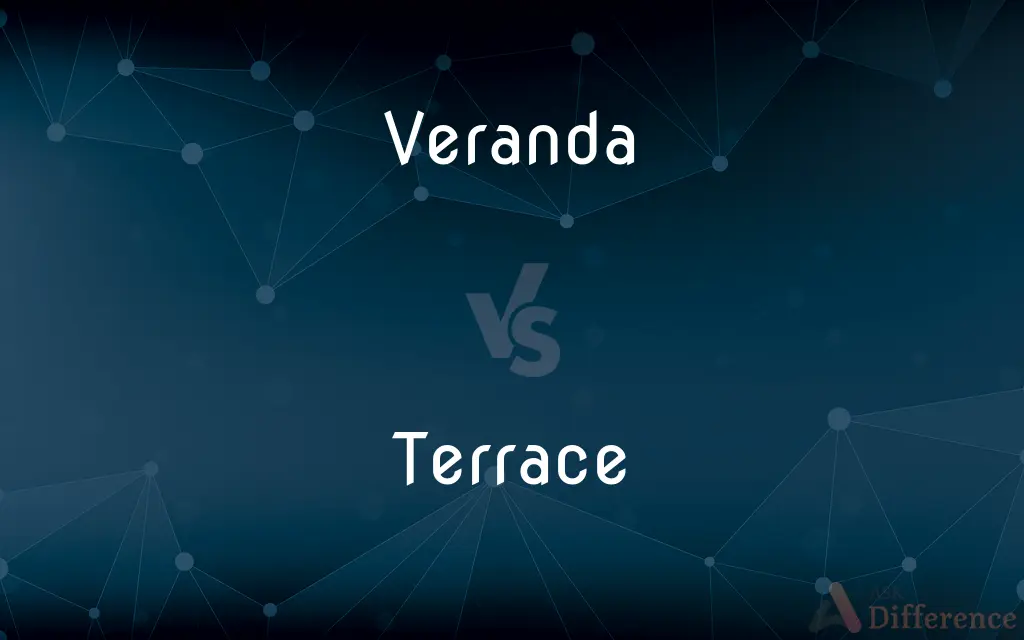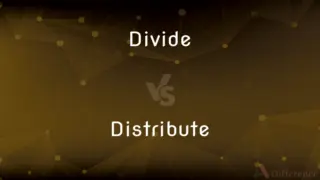Veranda vs. Terrace — What's the Difference?
Edited by Tayyaba Rehman — By Maham Liaqat — Updated on April 2, 2024
A veranda is a roofed platform along the outside of a house, often enclosed by a railing, whereas a terrace is an open, flat area, typically uncovered and on an upper level.

Difference Between Veranda and Terrace
Table of Contents
ADVERTISEMENT
Key Differences
A veranda is a feature of residential architecture, usually a roofed, open-air gallery or porch, extending along the outside of a home. It's often enclosed by a railing and is found on the ground level, providing a shaded area for relaxation and outdoor living. In contrast, a terrace is an open, flat area that's either attached to a building or part of a landscape. Terraces are typically uncovered and can be found at ground level or on upper floors, offering expansive views and space for activities or gardening.
Traditionally, verandas serve as transitional spaces between the indoors and the outdoors, offering protection from the sun or rain while allowing for the enjoyment of the outdoor environment. They are common in tropical and subtropical climates, where the blend of indoor and outdoor living spaces is a key architectural consideration. Terraces, on the other hand, are versatile spaces that can be used for a variety of purposes, including dining, gardening, entertaining, or simply enjoying the outdoors. They can be elevated, providing a vantage point for views, or integrated into the landscaping as part of a garden.
The design of a veranda often reflects the architectural style of the house, with decorative elements that match or complement the home’s exterior. Verandas can be simple, with minimal decoration, or elaborate, featuring intricate railings, columns, and flooring materials. Terraces might be designed with a more functional approach but can also include aesthetic elements such as paving stones, planters, and outdoor furniture, enhancing the overall appearance and utility of the space.
In terms of construction, a veranda is typically attached to the side of a house and supported by pillars or columns. It requires a roof structure that integrates with the existing roof of the home. A terrace, especially if elevated, may require additional structural support, such as retaining walls for a terrace garden or a sturdy foundation for an upper-level terrace to ensure safety and stability.
Culturally, verandas and terraces both play significant roles in residential architecture, offering outdoor living spaces that cater to different preferences and uses. A veranda might be preferred in regions where there's a need for shaded outdoor areas due to stronger sun exposure, while terraces are ideal for enjoying moderate climates, views, and open-air activities.
ADVERTISEMENT
Comparison Chart
Definition
A roofed, open-air gallery or porch along the outside of a house.
An open, flat area, typically uncovered, attached to a building or part of a landscape.
Location
Usually ground level.
Can be ground level or on an upper floor.
Coverage
Roofed, providing shade and protection from the elements.
Typically uncovered, open to the sky.
Purpose
Serves as a transitional space for relaxation and enjoying the outdoors.
Used for a variety of outdoor activities, including dining, gardening, and entertaining.
Design
Often reflects the architectural style of the house, may be enclosed by a railing.
Focuses on functionality and views, may include decorative elements like planters and furniture.
Structural Requirements
Supported by pillars or columns, integrates with the house's roof.
May require structural support like retaining walls or a sturdy foundation.
Compare with Definitions
Veranda
An outdoor living space with a roof.
The veranda was adorned with hanging plants and soft lighting.
Terrace
An open, flat area on an upper floor.
The restaurant's terrace offered panoramic views of the city skyline.
Veranda
A covered porch wrapping around a house.
We enjoyed the evening breeze sitting on the wicker chairs on the veranda.
Terrace
An uncovered outdoor extension of a building.
The apartment came with a spacious terrace for entertaining.
Veranda
An enclosed porch with railings.
The family gathered on the veranda for their summer meals.
Terrace
A paved area adjacent to a house.
The back terrace was their favorite spot for yoga in the mornings.
Veranda
A sheltered area outside a building.
The old farmhouse featured a wide veranda with a view of the gardens.
Terrace
A patio or balcony used for outdoor activities.
We set up a dining table on the terrace for the barbecue.
Veranda
A ground-level, roofed platform attached to a house.
The veranda served as a perfect spot for the morning coffee.
Terrace
A landscaped area for gardening.
The terrace garden was filled with herbs and flowers.
Veranda
A veranda or verandah is a roofed, open-air gallery or porch, attached to the outside of a building. A veranda is often partly enclosed by a railing and frequently extends across the front and sides of the structure.Although the form verandah is correct and very common, some authorities prefer the version without an "h" (the Concise Oxford English Dictionary gives the "h" version as a variant and The Guardian Style Guide says "veranda not verandah").
Terrace
A level paved area next to a building; a patio
Breakfast is served on the terrace
Veranda
A porch or balcony, usually roofed and often partly enclosed, extending along the outside of a building. Also called regionally gallery.
Terrace
Each of a series of flat areas made on a slope, used for cultivation.
Veranda
A gallery, platform, or balcony, usually roofed and often partly enclosed, extending along the outside of a building.
Terrace
A row of houses built in one block in a uniform style
An attractive Regency terrace
Veranda
An open, roofed gallery or portico, adjoining a dwelling house, forming an out-of-door sitting room. See Loggia.
The house was of adobe, low, with a wide veranda on the three sides of the inner court.
Terrace
Make or form (sloping land) into a number of level flat areas resembling a series of steps
The slope had to be terraced
Veranda
A porch along the outside of a building (sometimes partly enclosed)
Terrace
A porch or walkway bordered by colonnades.
Terrace
A platform extending outdoors from a floor of a house or apartment building.
Terrace
An open, often paved area adjacent to a house serving as an outdoor living space; a patio.
Terrace
A raised bank of earth having vertical or sloping sides and a flat top
Turning a hillside into a series of ascending terraces for farming.
Terrace
A flat, narrow stretch of ground, often having a steep slope facing a river, lake, or sea.
Terrace
A row of buildings erected on raised ground or on a sloping site.
Terrace
A section of row houses.
Terrace
Abbr. Ter. or Terr. A residential street, especially along the top or slope of a hill.
Terrace
A narrow strip of landscaped earth in the middle of a street.
Terrace
To provide (a house, for example) with a terrace or terraces.
Terrace
To form (a hillside or sloping lawn, for example) into terraces.
Terrace
A flat open area on the topmost floor of a building or apartment
Terrace
A platform that extends outwards from a building.
Terrace
(agriculture) A raised, flat-topped bank of earth with sloping sides, especially one of a series for farming or leisure; a similar natural area of ground, often next to a river.
Terrace
(geology) A step-like landform; (sometimes) remnants of floodplains.
Terrace
A row of residential houses with no gaps between them; a group of row houses.
Terrace
A single house in such a group.
Terrace
The standing area of a sports stadium.
Terrace
The roof of a building, especially if accessible to the residents. Often used for drying laundry, sun-drying foodstuffs, exercise, or sleeping outdoors in hot weather.
Terrace
To provide something with a terrace.
Terrace
To form something into a terrace.
Terrace
A raised level space, shelf, or platform of earth, supported on one or more sides by a wall, a bank of tuft, or the like, whether designed for use or pleasure.
Terrace
A balcony, especially a large and uncovered one.
Terrace
A flat roof to a house; as, the buildings of the Oriental nations are covered with terraces.
Terrace
A street, or a row of houses, on a bank or the side of a hill; hence, any street, or row of houses.
Terrace
A level plain, usually with a steep front, bordering a river, a lake, or sometimes the sea.
Terrace
To form into a terrace or terraces; to furnish with a terrace or terraces, as, to terrace a garden, or a building.
Clermont's terraced height, and Esher's groves.
Terrace
Usually paved outdoor area adjoining a residence
Terrace
A level shelf of land interrupting a declivity (with steep slopes above and below)
Terrace
A row of houses built in a similar style and having common dividing walls (or the street on which they face);
Grosvenor Terrace
Terrace
Provide (a house) with a terrace;
We terrassed the country house
Terrace
Make into terraces as for cultivation;
The Incas terraced their mountainous land
Common Curiosities
What differentiates a veranda from a terrace?
A veranda is a roofed, open-air platform usually at ground level, while a terrace is an open, flat area that can be at ground level or elevated, typically uncovered.
What are common uses for a terrace?
Terraces are used for dining, gardening, entertaining, or simply enjoying outdoor views and activities.
Is a veranda the same as a porch?
A veranda can be similar to a porch, but it often extends along the sides of a house, while a porch is usually located at the front or back entrance.
How does climate influence the choice between a veranda and a terrace?
In warmer, sunnier climates, a veranda may be preferred for its shaded, protected outdoor space, while terraces are popular in moderate climates where open-air living is more comfortable.
Are verandas and terraces exclusive to residential buildings?
No, both features can be found in commercial and public buildings, adding outdoor spaces for relaxation, dining, and other activities.
Can a terrace have a roof?
While terraces are typically uncovered to provide open-air space, some terraces may have temporary coverings or pergolas for shade.
Can a building have both a veranda and a terrace?
Yes, some buildings may feature both, with a veranda providing a sheltered outdoor space on the ground level, and a terrace offering an open, elevated area for views and activities.
How do verandas and terraces contribute to a building's aesthetic?
Verandas and terraces add to the architectural appeal of a building, offering outdoor spaces that can be aesthetically pleasing and functional.
What materials are commonly used in the construction of verandas and terraces?
Materials such as wood, concrete, stone, and tile are commonly used, depending on the design and structural requirements.
Can the design of a veranda or terrace affect a property's value?
Yes, well-designed verandas and terraces can enhance a property's appeal and potentially increase its market value by adding desirable outdoor living spaces.
Share Your Discovery

Previous Comparison
Paczki vs. Bismarck
Next Comparison
Divide vs. DistributeAuthor Spotlight
Written by
Maham LiaqatEdited by
Tayyaba RehmanTayyaba Rehman is a distinguished writer, currently serving as a primary contributor to askdifference.com. As a researcher in semantics and etymology, Tayyaba's passion for the complexity of languages and their distinctions has found a perfect home on the platform. Tayyaba delves into the intricacies of language, distinguishing between commonly confused words and phrases, thereby providing clarity for readers worldwide.














































